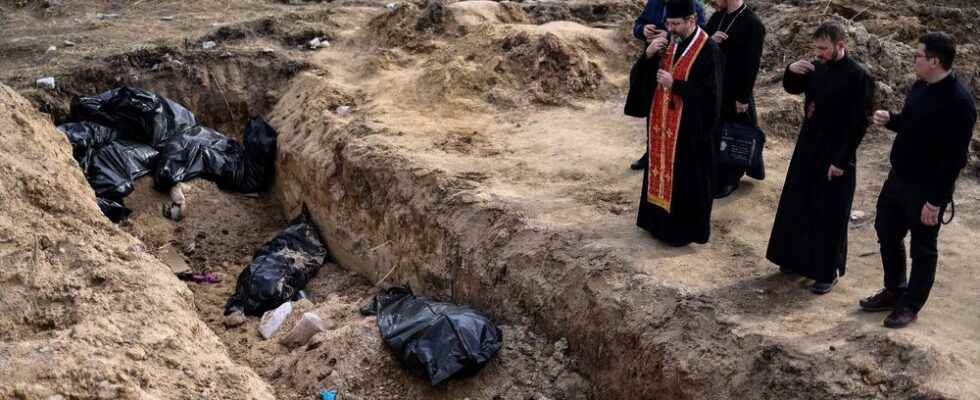Beyond the clash of arms, the war of words. US President Joe Biden for the first time accused Russia of “genocide” on Tuesday, saying it “is increasingly clear that Putin is simply trying to erase the very idea of being a Ukrainian.” If he was applauded in the process by Ukrainian President Volodymyr Zelensky – who himself had already used this term – then joined on this line by the Canadian Prime Minister, not all of them followed in the footsteps of the American president. Emmanuel Macron, in France, German Chancellor Olaf Scholz, or UN Secretary General Antonio Guterres, have thus refrained from using the term on their own. For Rachel Lindon, lawyer at the International Criminal Court (ICC) and specialist in crimes against humanity and genocide, the legal qualification of the facts will above all be up to international justice.
L’Express: Can the term “genocide” be used to describe the catastrophic situation in Ukraine?
Rachel Lindon: If, as Biden suggests, Putin’s intention is to erase the people of Ukraine, then the genocide label is correct. Indeed, the legal definition of genocide is murder, or serious bodily harm, with the intent to destroy, in whole or in part, a national, ethnical, racial or religious group. It is the total erasure of a category of people.
However, for the moment, I do not have at my level elements that would allow me to conclude this, as the American president does. To be able to speak of genocide, it would be necessary to be able to prove the intention to destroy all or part of the Ukrainian people. This is the role of the investigators of the International Criminal Court (ICC) present in Ukraine, who are responsible for gathering the elements which will then make it possible to precisely qualify the facts.
Priests pray in front of a mass grave with new corpses, in the small Ukrainian town of Boutcha, on April 7, 2022.
afp.com/RONALDO SCHEMIDT
It is however interesting to note that before launching his invasion, Putin had pretexted a beginning of genocide of Ukraine against the Russian-speaking populations in Donbass. This argument is reminiscent of that used in past genocides, which consists of accusing the opposing party of what one is about to do, to justify the fact of attacking first. It is a mirror accusation, which we had already found in Rwanda.
Emmanuel Macron spoke of “war crimes”, while Jean-Yves Le Drian evokes “crimes against humanity”. What is the difference between these notions and that of genocide?
A crime against humanity is a widespread or systematic attack against the civilian population, whether through murder, sexual violence, or torture. Like genocide, this can take place during an armed conflict, or not. Based on the information we have, it seems that the crime against humanity is constituted in Ukraine, through all the cases of torture, sexual violence, or generalized attacks against Ukrainian civilians.
War crimes, on the other hand, can only occur in the context of an armed conflict, in the event of violation of the rules of war set out in the Geneva Convention: the fact, for example, of attacking property purely civilian, such as schools, hospitals, theatres, or to humanitarian organizations. However, it should be borne in mind that qualifications can be combined. Just because there is genocide in one place does not exclude the possibility that war crimes or crimes against humanity have occurred in others. In Yugoslavia, there was a genocide in Srebrenica, as well as, at the same time, crimes against humanity and war crimes in other places.
Is it up to politicians to bring the accusation of genocide?
This qualification will only really make sense when there is a trial conducted by the International Criminal Court, and politicians will not be the judges. However, the fact that this word is used by politicians can be a way of waking up the international community to the seriousness of the events currently taking place in Ukraine. It is therefore not useless, insofar as what we are witnessing in Ukraine borders on the most serious crimes that exist on Earth. Genocide and crimes against humanity are, moreover, equivalent in their imprescriptibility, and condemned in the same way. Moreover, international justice will allow us to determine whether one and/or the other have been committed.
How is the International Criminal Court’s investigation going?
For now, the prosecutor of the International Criminal Court, Karim Khan, is present in Ukraine to collect evidence. Beyond the investigators of the ICC, many States contribute to the investigation – French gendarmes have for example been sent -, as well as NGOs. This will necessarily take time, even if in this case the investigation is progressing relatively quickly thanks to the many people mobilized.
At the end of the investigation, the ICC prosecutor may issue indictments against certain persons with qualifications, possibly of genocide, crimes against humanity or war crimes. Then, it will be up to the judges of the ICC to decide, and to issue one or more international arrest warrants.
Can we imagine that Putin will one day be brought before the ICC?
It is difficult to give an answer at the moment. First of all, it is credible that he will eventually be the subject of an arrest warrant. If this is the case, then there would be two possibilities: either, if he retains power, he will become a pariah and will have no choice but to stay in Russia to escape international justice. Either a change of regime is taking place in Russia in the more or less long term, and the new government could decide to refer him to the ICC for trial. This possibility cannot be ruled out, we remember that Slobodan Milosevic had ended up facing international justice for war crimes, crimes against humanity and genocide, during the wars of Yugoslavia.
